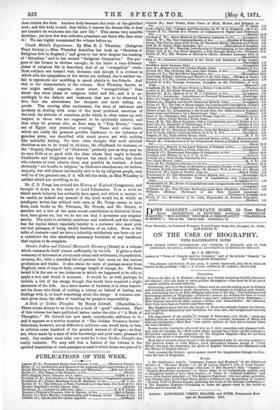Cousin Afabel's Experiences. By Miss E. J. Whateley. (Religious Tract
Society.)—Miss Whateley describes her book as "Sketches of Religious Life in England ;" and gives to her first chapter the heading of " Ritualism " and to her second "Religions Dissipation." The pur- pose of the former is obvious enough; in the latter a very different phase of religions life is described, that of an " evangelical " -circle. Both subjects are treated with fairness; and though it is evident to which side the sympathies of the writer are inclined, she is neither un- fair to opponents nor unwilling to speak plainly to her friends. And this is the characteristic of the volume. Miss Whateley knows, as one might easily suppose, more about "evangelicalism" than about any other phase of religious belief and life ; and it is ac- cordingly to the defects and weakness that are to be observed in this, that she administers her sharpest and most telling re- proofs. The craving after excitement, the want of reticence and modesty in dealing with some of the most profound emotions of the soul, the attitude of conscious pride which is often taken up with respect to those who are supposed to be spiritually inferior, and that often by persons who, as East says, in "Tom Brown," "came out of Egypt only yesterday evening." These and other faults which are really the greatest possible hindrance to the influence of genuine piety, are described with much power, yet with nothing like unkindly feeling. We have often thought that such satirical sketches as are to be found in Dickens, Mr. Chadband, for instance, or the "Deppity Shepherd "of "Pickwick," perfectly just as they may be, do very little or no good with the class whom they ought to benefit. Chadbands and Stigginses are beyond the reach of satire, but those who tolerate or even admire them may possibly be touched. A. book obviously "not hostile to religion,' as Dickens's sketches are, we believe, unjustly, but still almost universally said to be by religions people, may well be of the greatest use, if it will tell the truth, as Miss Whateley is neither afraid nor unwilling to do.
































 Previous page
Previous page